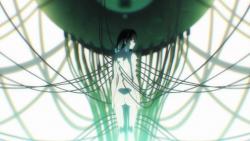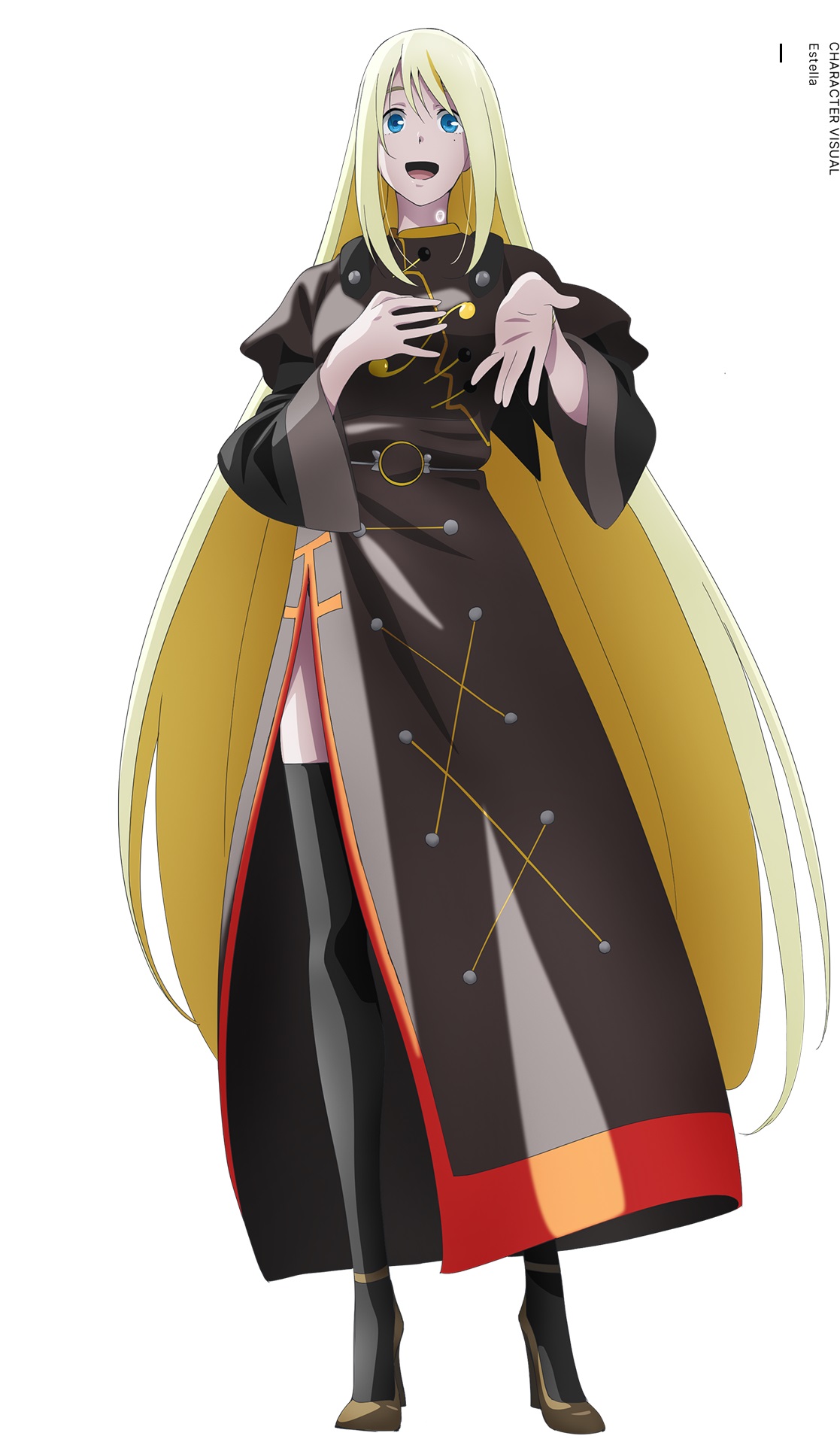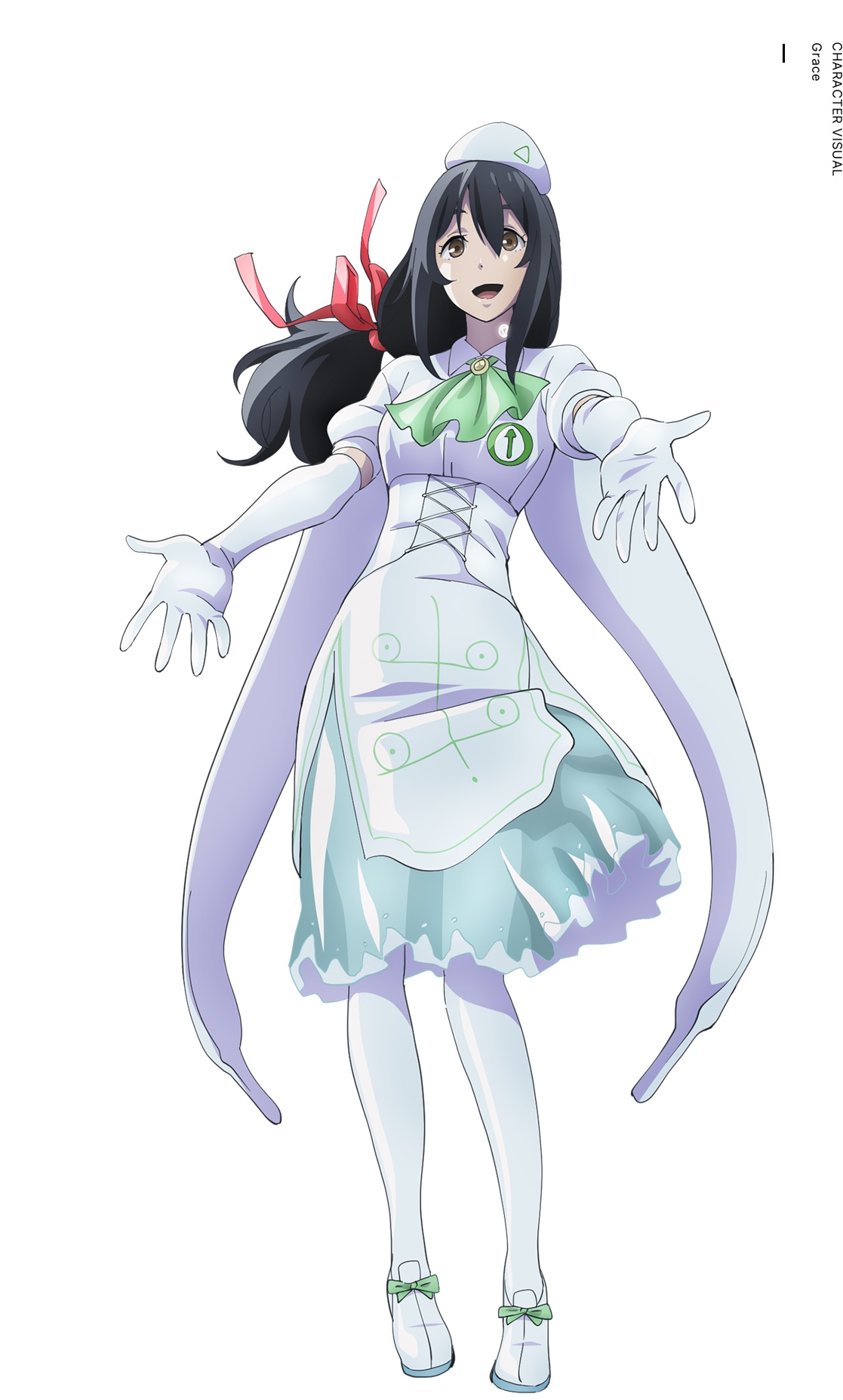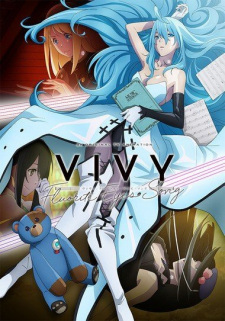vivy fluorite eyes song персонажи
Vivy fluorite eyes song персонажи
Виви — первый человекоподобный искусственный интеллект. Созданная для увеселения посетителей парка развлечений, она встречает Мацумото, ещё одного ИИ, пришедшего из будущего, и её жизнь меняется. У них есть великая цель: исправить историю и предотвратить войну между ИИ и людьми. Чтобы достичь успеха, у Виви есть 100 лет!
|
| Герои аниме |
|
|
| ||||||
|
|
| все персонажи |
| Эпизоды |
| # | эпизод | сценарий | раскадровка | режиссёр эпизода | анимация |
| 1. | My Code: To Make Everyone Happy with My Singing 03.04.2021, 25 мин. | Умэхара Эйдзи Нагацуки Таппэй | Эдзаки Симпэй | Хун Пэйни | Такахаси Юйти |
| 2. | Quarter Note: The Beginning of the One Hundred-Year Journey 03.04.2021, 25 мин. | Умэхара Эйдзи Нагацуки Таппэй | Кубо Юсукэ | Кубо Юсукэ | Мики Тосиаки Эбису Такума |
| 3. | A Tender Moon Tempo: A Pleasant Chat with the Stars 10.04.2021, 25 мин. | Умэхара Эйдзи Нагацуки Таппэй | Наганума Норихиро | Хориути Наоки | Ямада Синъя Масутани Юки Ямасита Мэгуми Такахаси Юйти |
| 4. | Ensemble for Polaris: Our Promise 17.04.2021, 25 мин. | Умэхара Эйдзи Нагацуки Таппэй | Наганума Норихиро | Ами Сюдзиро | Нагиса Михо Цудзимура Юкитэру Мурата Нобуаки Ли Шаолэй Эбису Такума |
| 5. | Sing My Pleasure: To Make You Smile 24.04.2021, 25 мин. | Умэхара Эйдзи Нагацуки Таппэй | Оцуки Ацуси | Хун Пэйни | Ямада Синъя Саотомэ Хина Сайто Тихиро Масутани Юки Такахаси Юйти |
| 6. | Sing My Pleasure: I Love You 01.05.2021, 25 мин. | Умэхара Эйдзи Нагацуки Таппэй | Кубо Юсукэ | Кубо Юсукэ | Идзава Тамами Усами Койти Эбису Такума Окамото Тацуаки Саотомэ Хина Мики Тосиаки Ямаути Рё Ямада Синъя |
| 7. | Galaxy Anthem: To Make Everyone Happy with My Singing 08.05.2021, 25 мин. | Умэхара Эйдзи Нагацуки Таппэй | Намики Сао | Хориути Наоки | Сингу Юсукэ Фудзии Дайки Сайто Тихиро Масутани Юки Линь Кэвэй Ли Шаолэй Такахаси Юйти |
| 8. | Elegy Dedicated with Love: My One and Only Beloved Partner 15.05.2021, 25 мин. | Умэхара Эйдзи Нагацуки Таппэй Кавагути Томоми | Хо Чон | Хун Пэйни Катагири Такаси | Мики Тосиаки Ямада Синъя Сайто Тихиро Саотомэ Хина Кудо Юка Эбису Такума |
| 9. | Harmony of One`s Heart: My Mission, Your Future 22.05.2021, 25 мин. | Умэхара Эйдзи Нагацуки Таппэй | Кубо Юсукэ Эдзаки Симпэй Токумару Масахиро | Хирамуки Томоко Итога Синтаро Кубо Юсукэ Эдзаки Симпэй | Цудзимура Аюму Хара Сюити Кавамото Рэйё Фукуда Хироки Накахара Руна Токумару Масахиро Такахаси Юйти |
| 10. | Vivy Score: Singing from My Heart 29.05.2021, 25 мин. | Умэхара Эйдзи Нагацуки Таппэй | Кавабата Такаси | Ямамото Сусуму | Сингу Юсукэ Идзава Тамами Фудзии Дайки Линь Кэвэй Чэнь Юфэн Хан Синьхуа Чэнь Цзецюн Хуан Фэн Гу Цзиньцю Чжу Чжэн Эбису Такума |
| 11. | World`s End Modulation: April 11, 2161 05.06.2021, 25 мин. | Умэхара Эйдзи Нагацуки Таппэй | Миядзи Масаюки | Хун Пэйни | Цай Мэншу Тан Туань Чэн Чжэньлэй Вэн Чаовэй Ли И Чай Чэньчжун Ян Кэсинь Чэнь Юфэн Хан Синьхуа Чэнь Цзецюн Хуан Фэн Гу Цзиньцю Чжоу Цзянь Чжоу Сяохуа Ли Шаолэй Такахаси Юйти |
| 12. | Refrain: My Mission 12.06.2021, 25 мин. | Умэхара Эйдзи Нагацуки Таппэй | Кубо Юсукэ | Кубо Юсукэ Ямадзаки Кёко | Саотомэ Хина Фудзии Дайки Мики Тосиаки Цудзимура Аюму Цай Мэншу Эбису Такума |
| 13. | Fluorite Eye`s Song 19.06.2021, 25 мин. | Умэхара Эйдзи Нагацуки Таппэй | Эдзаки Симпэй | Эдзаки Симпэй | Ямада Синъя Саотомэ Хина Сингу Юсукэ Танака Масааки Линь Кэвэй Токумару Масахиро Эбису Такума Такахаси Юйти |
Тьфу.
Ваять рецензию на эту анимешку я не собирался и не хотел, но авторы умудрились мне конкретно насолить.
10. Сюжет простой и прямой как бревно, никаких сюжетных поворотов (которые характерны для того же Ре:Зеро), тут и близко нет.
Стоили ли эти плюсы тонн фейспалма, обрушившихся на меня? Понятия не имею.
P.S. 9я серия правда до нелепости крутая, о конкретно её просмотре не жалею ни капли.
| +22 |  | Если Вы считаете этот комментарий полезным, то проголосуйте за него. |
Но никто же так просто не поверит.
Можно похвалить первый эпизод за сильную премьеру, отметить пару моментов с ротоскопией игры на пианино. Сериал держится на нормальном визуальном уровне, но явно не хватает вплетения визуала в повествование, потому что сценарист умеет только в грубую экспозицию, а режиссёры занимаются каким-то примитивом по типу птицы в клетке.
И вот, для продвижения проходного сериала позвали Таппея Нагацуи, автора низкокачественной писанины Резеро. Здесь засветился и Умехара Эйджи, но Виви страдает от всего, что характерно именно для творчества Таппея.
Сериал нереально глупый. До невозможности глупый.
Вся история строится на одном путешествии во времени. Путешественник удивляется тому, что после отмены определённых событий известное ему будущее меняется.
Но всё было бесполезно. Горе путешественник во времени за сто лет не догадался, кто нажал красную кнопку. А это был внезапный злодей из кустов, который обесценил 11 эпизодов сериала, так как всё было бессмысленно. Тут можно было порассуждать, что за такой срок изменилась главная героиня, но! Она ИИ. Сериал абсолютно никак не работает с этой её стороной, персонаж ощущается как обычный человек. Финальный босс никак не объясняет суть конфликта, нет работы с темой «человечество и искусственный интеллект». Ни-че-го. И только гений сценарной мысли выдаёт план по спасению мира через песню.
PS На стриминговых сервисах засветился дунхуа Shiguang Dailiren с таким же сюжетом о путешествии во времени: один объясняет как менять будущее, другой исполняет. Сериал не может соперничать с Виви по визуальному оформлению, да и не то чтобы там писали какие то особенные вещи; но на момент онгоинга это смотрится не так глупо. Во всяком случае, сценаристы не лезут в жанр, который им не по зубам.
| +16 |  | Если Вы считаете этот комментарий полезным, то проголосуйте за него. |
С самого начала сабж цепляет дорогущей графой и весьма детальной моторикой движения, на которую авторы постоянно обращают внимание зрителя. Задники хороши, модельки ключевых персонажей тоже, но вот внешний вид статистов сделан на тречку. Сама их рисовка с технической точки зрения не вызывает вопросов (даже компьютерная графика, если и применяется для них, то совершенно незаметна), но вот одежда… При общей «хай-тек-фантастичности» тайтла, прикиды толпы отдают замшелым ретрофантастическим кинцом середины прошлого века, где вкатывающиеся в современные технологии фантасты честно полагали, что общество будущего будет ходить в одном варианте одноцветного костюма для мужчин и одной одноцветной комбинации юбка-блузка для женщин. С одной стороны, они не далеко ушли от истины в плане мужской одежды, но вот с одноцветностью обосрались по полной. Смешно смотреть, как люди будущего, словно сектанты, все ходят в одинаковых белых шмотках с зелёными лампочками словно ггГгГгггГэймеры с их любимой подсветкой коврика. Из-за этого дизайн персов воспринимается «на отвали», в нём не видно стараний.
Из одежды ключевых героев более-менее запомнились только первые наряды главной героини. Чем дальше шло повествование – тем более скучным и безвкусным становились её шмотки. Вроде кажется, что это фигня, но из-за такой мелочи все статисты выглядят как клоны, и это моментально режет глаза после тайтлов 80-90х, где статистов в ТВ-сериалах порой рисовали так, как сейчас главных героев не изображают. Ну а так халтурно относиться к внешке главных героев – это вообще возмутительно. Тут меня можно было бы справедливо пнуть за лицемерие, ведь в тайтлах с формой меня это не парит (там ведь форма! ). Но тут шмотки выглядели как клоунские поделия реальных модельеров.
Компьютерная графика (которая «паршивая») в основном используется для изображения машин (выглядят не огонь) и для анимации companion cube с его различными трансформациями (вот это уже выглядит вполне достойно).
Рисовка часто чередует более «анимешные» кадры с «упрощённым» дизайном и «супердетализованные» как правило статичные арты, которые немедленно идут на скриншоты. Увы, это 99% касается только главной героини, а количество таких артов становится тем меньше, чем ближе сюжет идёт к развязке.
Экшен-сцены анимированы просто шикарно, а как по меркам сезона так выше всяческих похвал. Единственно, им недостаёт колоритности и яркости, т.к. крутых фраз нет, в кадре слишком много дристающейся камеры, а под конец драчки вообще переходят из категории нормального рукопашного / огнестрельного мочилова в какие-то убогие Яйца Дракона с карикатурными полётами героини верхом на кубиках из тетриса, сопровождающихся дриснёй и спамом ракет из Макросса. Звучит как фарс, выглядит примерно так же.
В тайтле есть немного шок-контента в виде кровищи и расстрелов.
Теперь к музыке. Тайтл всячески пытается казаться музыкальным, ведь главная героиня – певица, мечтающая выступать на большой сцене. К сожалению, работница ртом она так себе: репертуар составляет затхлая попса (акцент на «затхлая»), которая, может и идёт ГГ, т.к. она робот, но вот меня совершенно не впечатлила. Окружающие персы, кстати, с песен робоайдолов ссутся так, словно это божественное откровение. Честно говоря, песни больше казались притянутыми в сюжет за уши и совершенно ненужными, особенно, когда музыкальная часть начинала перехватывать фокус у основного сюжета.
Музыкальное сопровождение 99% крутится в фоне и не особенно заметно, поэтому за душу лично меня треки совершенно не зацепили.
Вместе с тем, видно, что авторы старались: например, красиво интегрировали опенинг в серию, а не просто нахлобучили его в начале каждого эпизода, в ряде сцен песни смотрятся уместно (например, во время падения космической станции). Если же посмотреть объективно, то оказывается, что менее музыкальные тайтлы вроде Mai-Hime, Project Eden или Iczer-1 содержат больше запоминающихся треков, чем Vivy. После просмотра перечисленных аним в голове остаётся единственная мысль: «ОСТ МНЕ СЮДА, ЖИВО! ». После Vivy я лишь удивился, вспоминая, где именно там была музыка.
Сценарий и всё, что его касается – моя главная точка преткновения в сабже. Сюжет хорошо складывался ровно до того момента, когда выяснилось, что он полностью арочный, связь между арками сделана через пень-колоду, а большая часть чардевелопмента происходит как раз в не показываемых промежутках. Сама по себе идея сделать мини-истории не такая уж и плохая, но её конкретная реализация сильно хромает.
Основной сюжет выглядит так: в будущем так обожающие цифровизацию дурачки столкнулись с тем, что все наштампованные ими «умные роботы» вдруг вышли из-под контроля начали мочить людей. Разумеется, армия и полиция ничего с этим не смогли сделать, поэтому единственным выходом оказывается замороченный финт ушами. Профессор отправляет в прошлое робота, дабы он вышел на контакт с рандомным роботом-певичкой, первым автономным образцом андроида нового поколения. Ему (ей, главной героине Виви) уже предстоит помешать роботам сойти с ума.
Затем в конце после ещё целой кучи таймскипов появляется его внучка, о которой тоже на пальцах толкают три слова и, видимо, полагают, что зрителям этого будет достаточно для проявления сильной эмпатии, когда у неё случается передозировка свинца.
Никаких обещанных ужасов героиня в своих приключениях не видит, персонаж её меняется скачкообразно от таймскипа к таймскипу, причём изменения происходят именно за экраном, не давая там самым достаточно времени зрителю, чтобы посмаковать чуйства. Какой-то характер и личность Виви имела лишь в первой арке, где это была мрачная роботесса, натягивающая фальшивую улыбку во время выступления перед тремя зеваками. Чем дальше, тем более она становится какой-то пустой, стандартной, аморфной заглушкой для экшена (очень похоже на чардевелопмент Ичиго из Блича – просто посмотрите первые 10 серий и последние 10). В одной арке, ХОБА, и она «спрятала свою личность» за другой, более энергичной и самоуверенной. Потом, ХОБА, первая возвращается таким же внезапным способом, как и уходит. Увы, уже без былого колорита, эмоций, чувств, т.к. к этому времени сценаристы окончательно определились, что сторонние болванчики им интереснее, чем Виви. Героиня – просто случайный пассажир в потоке сценарного поноса; времени на её развитие у авторов вообще не нашлось.
Всё её продвижение к цели осуществляется рандомными встречами и заданиями от Куба + драчками, но не осмысленными диалогами, что сильно контрастирует с тем, как героиню изначально представили.
Сам Куб – откровенно ненужный уродец, своими погаными шутейками портивший всю первую арку. Что ни мрачная сцена с угрюмой певицей, то сразу появляется разбавление тона дриснёй Мацумото. Во второй половине сериала он вообще появляется эпизодически.
Профессор, про которого на этапе его повторного появления все уже забыли, организуется абсолютно рандомно: героиню засунули в музей, куда со школьной экскурсией наведывается некий карлан. Он так вдохновляется музейным экспонатом, что на протяжении всей жизни постоянно приходит болтать с Виви, а потом, ХОБА, становится тем самым профессором.
То, что большинство персонажей роботы, тоже никакого отражения в сюжете не нашло кроме постоянного скуления про «я должен исполнять свой долг». С таким же успехом это могли быть обычные люди – ничего бы вообще не изменилось.
Концовка ровно такая же смазанная, как и весь остальной сюжет: на фоне каких-то там летающих кубов и перестрелок мужиков в одинаковых шмотках с андроидами в одинаковых шмотках главная героиня наконец исполняет свою мега-песню, которая она сочиняла на протяжении нескольких десятилетий, и этого становится достаточно, чтобы переубедить компьютер. Дело в том, что компьютер единый, но одна его часть решила дать людям шанс – если Виви споёт, то комп решит не убивать народ. Втф?
Я так пишу, словно бы каждая сцена произведения – какая-то несусветная параша, но это не так. Проблема исключительно в том, что они настолько сумбурные и вообще не связанные с главным сюжетом, что это портит всё впечатления от просмотра. Для чардевелопмента они не подходят, Виви и Мацумото как персонажи вообще не развиваются, даже деградируют. Сторонние персы не нужны от слова совсем и совершенно неинтересны, ведь тайтл у нас не про путешествия Кино / Элейны, а с цельным сюжетом. Т.е. я смотрю арку, вроде всё в ней нормально, а потом внезапно приходит осознание: «Зачем всё это?», «Для чего эти персонажи?», «Это что, технодемка?». Авторам надо было либо основную ветку из сюжета выкинуть, либо не пытаться обмануть систему.
Зато подача очень лёгкая, за экраном не зеваешь, любуешься красотами, особенно во время драчек. Обидно, что Wit так зафейлили сюжет притом, что сценарист вроде как должен был быть рукастым, да и тема с временными прыжками у него ранее вполне неплохо получилась (по крайней мере в первом сезоне Re Zero точно). У Vivy был просто заоблачный потенциал, но авторы не упустили возможность упустить возможность. Обидно.
Тл;др: авторы настолько увлеклись своим графончиком, что забыли про сюжет. Хороший середняк на один раз – 5 баллов из 7 за графон, экшен, первую арку и лёгкую подачу.
Кстати, чисто по приколу: абсолютно помойный Beatless, всратый в плане графона и бюджета (его показ даже прервали), имеет гораздо более крутую музу и намного более глубокий и роботоориентированный сюжет, чем Vivy; да и персонажи там интереснее. В нём есть, над чем подумать и что повспоминать, здесь – нет. Зато Vivy отлично смотрится и вызывает желания прокручивать происходящее, в отличие от.
Vivy: Fluorite Eye’s Song
Alternative Titles
Information
Statistics
External Links
Synopsis
When highly evolved AIs set out to eradicate mankind, the carnage that ensues fills the air with the stench of fresh blood and burning bodies. In a desperate bid to prevent the calamity from ever occurring, a scientist bets everything on a remnant from the past.
Turning the clock back a hundred years, AIs are already an integral part of human society, programmed with specific missions meant to be carried out for their entire course of operation. Vivy, the first ever autonomous AI, is a songstress tasked with spreading happiness through her voice. In a theme park where she hardly ever gets a proper audience, she strives to pour her heart out into her performances, bound to repeat it day after day—that is, until an advanced AI from the future appears before her and enlists her help in stopping a devastating war a hundred years in the making. With no time to process the revelation that flips her world upside down, Vivy is catapulted into a century-long journey to avert the violent history yet to come.
[Written by MAL Rewrite]
Background
Related Anime
Characters & Voice Actors
Matsumoto
Estella
Ophelia
Grace
Elizabeth
Kakitani, Yuugo
Antonio
Saeki, Tatsuya
Staff
Opening Theme
Ending Theme
Reviews
| Overall | 9 |
| Story | 0 |
| Animation | 0 |
| Sound | 0 |
| Character | 0 |
| Enjoyment | 0 |
«My mission is to make everyone happy by singing»—Vivy
«My mission is to make everyone content by reviewing»—Pipe
Vivy: Fluorite Eye’s Song, Vivy for short, is a spectacular series. It combines action, smooth animation sequencing, solid character development, a fantastic soundtrack, and a story that could have more holes than Gruyère cheese, but who cares. I don’t mind if it’s rife with time travel misconceptions and clichés; it is still delightful and quite surprising. I love this series. However, if we overthink the plot, we will lose all the enjoyment of this series, the beauty behind the story, and all the mysteries surrounding Vivy. For example, few spectators might find it ridiculous for an AI to take responsibility for saving the world from nowhere or the thought of time travel in this series. If you don’t like these ideas, you will hate this series.
At first, what gets my attention is Vivy, an AI that has a single goal, making everyone happy with her singing. A similar plan to mine with this review. However, her mission changes after several events that happened over a timeline of 100 years. First, a malign AI codenamed «Matsumoto,» I call him malign because he is an interloper, and the archive (Arayashiki) couldn’t remove him from Vivy’s core. Matsumoto requests Vivy’s help, and he gives a new objective to prevent the war between humans and AIs in 100 years. He creates «The Singularity Project» to change AI’s important events that lead to the war.
The world setting is easy to understand. Humans developed AIs for almost every task and became highly dependent on them. However, Vivy’s premise is truthfully a bit more complex to digest. One of the most challenging concepts to accept in the story is the AI time travel interpretation. I don’t want to enter into the metaphysical and metaphorical time travel description of how Matsumoto traveled 100 years back. Still, the authors are clever in avoiding this discussion because it could bring misconceptions. The authors skip all the paradoxes that a lousy explanation could create.
Furthermore, they averted the comparisons with similar plots such as Steins: Gate or even Re: Zero. Ultimately, it’s a series that uses the past to point toward the future, as the opening quote, from H.G. Wells’ «The Time Machine,» suggests: «We all have our time machines, don’t we? Those that take us back are memories, and those that carry us forward are dreams.» Matsumoto’s information is the memories, and Vivy’s mission is the dream that evolves during the long journey. In conclusion, we can end all the time travel discussions with a single line «they conceived the time travel.»
Nevertheless, the series is no perfect. The negative factor for some fans is the pacing. Sometimes you will feel that some parts are missing and needs an explanation; I believe the issue appears for lack of time, but overall, the series is terrific, with some minor problems.
On the other hand, the most fantastic part of the plot falls on Vivy. That’s what gets me hooked on watching the series. If we pay closer attention, the authors didn’t need a set of rules similar to Asimov’s laws. Instead, they only give every AI a single mission, and, in the case of Vivy, they create a character who tries to follow that single mission. In exchange, Vivy changes and struggles to understand and complete the Singularity Project from the perspective of her mission.
Moreover, Vivy is more profound than just great animation and drawing. It is a show that takes us into Vivy’s journey about herself. Vivy assimilates little by little reason, feelings, passion, and maybe heart. I am curious apropos of how Vivy will handle all the contrasting information that could interfere with her mission. Can an AI evolve and change during this journey, and how will she decide differently from the typical machine learning concept but following a synthetic life envisage. Can an AI develop something similar to a spirit or soul?
Although the rest of the characters are pretty interesting, such as Vivy’s sisters, the time skip may not let us explore their whole personality, which is a problem. Also, it is common in the sci-fi time travel plot that someone goes to the past and forces a change for the future. So happens here with the AI Matsumoto. This cube traveled back in time, and Vivy considered it a virus initially. However, equal to Vivy, this compelling character is the main factor influencing Vivy’s decisions and helps her to grow. It has a weird personality, never stops talking, and occasionally could be annoying, but it is the perfect partner that appears in the precise moment.
Another essential concept for the series is Arayashiki, aka Archive. There is not too much to say, and several viewers won’t consider it a character. However, in Mahayana Buddhism, Arayashiki is the eighth foundational level of consciousness. It stores patterns from other forms of awareness and retains developments and thoughts to use in other lives. In the plot, Arayashiki stores and interprets all the data from the AIs then decide based on that information. It is an exciting fact that grabs my attention because it justifies the whole of Vivy’s evolution story.
From technical aspects, I don’t have anything to complain about the production. The art is fantastic and well structured. It has a broad combination of diverse palettes, and the choreography and camera angles are precise and affect the story. The sound is marvelous and has one of the most pretty scores from the year. Furthermore, the songs are lovely, in particular Harmony of One’s Heart. Regarding the VO, there are some significant problems because Vivy’s voice isn’t the same when she sings, and for a trained ear, it is a letdown.
Finally, Vivy’s is a series that has several good things and few bad things. It is an action-packed thriller that most of the viewers will enjoy. I love the show; I consider it one of the best from this year and possibly one of the best original series from the last years. I am sad because this series is not getting the recognition it deserves but is causing a great impression in Japan. It is a must to watch.
PS: I am confident that I will fail my mission. But, fear not, I will not promote the hate for the humans between my fellow AI sisters.
| Overall | 5 |
| Story | 3 |
| Animation | 9 |
| Sound | 9 |
| Character | 4 |
| Enjoyment | 7 |
Throughout the years, dozens of sci-fi stories have given us terrifying scenarios in which robots and artificial intelligence wreak havoc upon mankind. No one can say we weren’t warned when our computers, iPhones, and microwaves destroy the world. Clearly, these stories haven’t been enough to convince us that we’re in danger. Vivy: Fluorite Eye’s Song could be the first anime to succeed at warning us of the great threat posed by technology.
Vivy’s premise is a combination of beloved stories and Hollywood films about sentient robots solving humanity’s problems, whether intentionally or coincidentally—Ghost in the Shell, Terminator, Blade Runner, iRobot, and A.I. Artificial Intelligence, to name a few. Vivy may not rank among the classics, though it’s impressive audiovisuals will inevitably land it a place on «Best Sci-fi Anime» lists. Written by Tappei Nagatsuki, of Re:Zero fame and produced by none other than WIT Studio, it was bound to create ripples throughout the anime community. Doubtlessly, the premiere episode caught fans’ attention. It begins with a clichéd cold open. A city full of humanoid robots sing a horrible melody out of tune, plumes of smoke rise above the futuristic architecture, people run through the streets screaming, and ounces of blood cover the pavement. Then it ends—this is the future ahead of our titular heroine, Vivy. One which she is asked to prevent.
50 years in our future, Vivy prepares to sing in front of a small audience. Her stilted performance and hollow singing left the citizens underwhelmed. After all, Vivy is “the first autonomous AI” ever created; Her purpose is to sing for the entertainment of citizens. While preparing for her next song, a robotic stuffed bear, given to her as a gift, suddenly calls out to her. The bear, who introduces himself as Masamoto, was sent to warn her about the future apocalypse. Once she comes to believe him, she is swept into a whirlwind of government conspiracy, a gang of criminals, murderous robots, terrorism, and more.
Masamoto’s plan to prevent the apocalypse is known as the Singularity Project. He revisits her throughout the years to stop ‘Singularity Points’. These are the significant events that cause the disastrous future, and it’s Vivy’s responsibility to prevent them from happening. All of this information is explained in a lengthy exposition dialogue during the first episode. «Telling» rather than «Showing» is the frustrating pattern of this show’s script. Vivy was chosen because, in the apocalypse, she is the only autonomous AI left uncorrupted. Masamoto reprograms her to have combat abilities during combat, which somehow gives her the power to shield bullets with her bare hands, dodge bullets, and run as fast as a train. If that sounds stupid, well, it kind of is, but the animators make it look badass.
At its core, this is a thriller anime with a splash of music. Vivy’s programmed goal is to be a singer, and it shows. Vivy’s singing and mannerisms change as time flies by, visualized with brief performances. The song reused the most is the opening, which is fantastic on both visual and audio fronts. When the show focused on her music career, her dreams and passion showed she has a heart: music and an audience her sole motivations. Yet, we don’t see it enough. It would be offensive to claim she has «no personality» because it’s OK not to present your emotions outwardly. Writing Vivy in such a way detracted from the story it attempted to tell. Whether Vivy accomplishes an outstanding performance or fails to get a crowd, she has very little response. Happiness, pride, or dismay are hard to tell, though we can infer her emotions. Her face is nearly expressionless, her voice is constantly monotone, and she has little to no body language indicating what she’s thinking. This is not uncommon for films starring AI characters—after all, Arnold Schwarzenegger only had 17 lines in Terminator. However, he wasn’t the main character, and Vivy is. Her subdued personality isn’t the problem. It’s how she lacks autonomy in the series named after her.
Rather than being a heroine, she was more of an interchangeable pawn being guided through the plot by an obnoxious robot man in her head, rather than a heroine with her own autonomy. The few times she rejects Masamotos orders, there is a glimmer of hope she may regain agency in her own story. Then the moment ends, and the script is thrown back into Masamoto’s court. All of their excursions in reshaping history are planned by him. He does everything for her with future robot abilities, no matter how illogical, and Vivy does the fist fighting. Her hero’s journey was more like a long video game tutorial played by someone else.
Masamoto, an irritating AI that takes the form of a teddy bear and a flying cube, exists to guide Vivy through the plot. Imagine if you combined Jarjar Binks with a sarcastic supercomputer. That’s him. His voice is grating, like nails on a chalkboard—and the actor has a history of good voice acting, the screenwriting and directing are entirely to blame for wasting a good voice actor. Jun Fukuyama previously voiced Koro-sensei in Assassination Classroom, which he performed exceptionally. The world-building is reliant on Masamoto’s exposition. He’s not a character. He is a mouthpiece for the writers to hold our hand through the complicated story. There’s plenty to criticize about Masamoto because he, unfortunately, was given the majority of the dialogue.
Masamoto constantly condescends to Vivy, removes her autonomy, and provides painfully unfunny slapstick humor. The show has a habit of creating unintentionally funny situations: Imagine a random guy hysterically running into the street, only to get hit by an AI-controlled taxi that says, «Thank you for your patronage.» It’s hilariously foolish, even more, because the show takes it deadly seriously. Towards the beginning, I took it seriously due to the art direction. During specific moments, the frame will fixate on Vivy, and the visuals increase in detail to admire her beauty and convey emotional significance. Every feature on her expressionless face is maximized as if it was drawn to be placed in a museum. Then seconds later, we return to the same art style. These jarring shots remind us that Vivy requires artists to endear us to her rather than through the screenplay.
Due to Vivy’s plot structure, side characters often last only two or three episodes, then they are forgotten. For some reason, every intelligent or character with power is male—with similar bland appearances. Unfortunately, their best designed characters aren’t the ones who do the talking. Every named female character is given the role of singer, caretaker, spouse, all of whom are AIs following orders with little autonomy. The only odd one out is Vivy—solely because Masamoto reprogrammed her to do the fighting for him. Every sentient AI in this world is a beautiful woman. No men, which begs the question, why? Is it because people are more receptive to AI if they’re women? Are the robot creators all men? Of course, this is left unexplored. All of these negative factors point to one answer; the show simply has a narrow view of identity. The best futuristic sci-fi stories challenge modern society’s problems, such as social hierarchies. Vivy is more content with reinforcing them.
The utopian futuristic setting is rich with possibilities: There’s no poverty, pollution, war, racism, or crime, except for the AI haters. But why? There’s no further exploration. The world is essentially concept art. After each time, skip minor changes beyond superficial aesthetics: Holographic images, floating screens and keyboards, different dress codes, shinier buildings, and increasingly abstract architecture. These are set-dressing distracting from the real problem—this setting is a juvenile interpretation of society. A world like this might exist someday, but it needs to make sense. The writer doesn’t even attempt to make sense of it, flat out ignoring history. No matter what time period, people of all backgrounds are dumber than ants. They make the dumbest choices possible in order to cause drama and conflict for Vivy to resolve.
Vivy’s wealth of missed opportunities extends to its antagonists as well. Why do the antagonists despise robots? They insist they hate them, but for vague reasons. Metal bitch! Disgusting robots! Why? There are plenty of motivations based on other sci-fi stories: a fear of bots replacing human workers, drastic change is scary, paying AI wages, or whether or not AI should raise children. However, it’s not our responsibility to write the villains’ motivations. The thing is, there’s no real reason why there shouldn’t be robots here; this world is nearly perfect aside from rare malfunctions every few years. If the sentient robots revolted against the nation to gain equal rights to humans, then a reactionary movement would make sense. As far as we’re shown, none of the sentient robots are paid, have the right to own property, or to vote in elections. There were plenty of opportunities to make this «Singularity» thoughtful, instead, they settled with “Malfunctioning robots kill lots of people.” To seriously consider this a cautionary tale is foolish. A multitude of better stories about artificial intelligence have already warned me. When robots eventually overthrow humankind, I’ll be ready for them.
The production of Vivy: Fluorite Eye’s is nothing short of incredible: beautiful character designs, top-notch voice acting, awe-inspiring fight choreography, melodic BGM, and professional insert songs. The culmination of skilled artists led to this anime’s creation. Anyone would assume the storytelling, characters, and script would be on par with the rest with such a talented team. Sadly, that is not the case at all. Vivy lacks both intellectually engaging storytelling and character depth to stand with the greats of the genre. The overwrought finale attempts to tie the tangled plot threads and convoluted timeline together, but it rang hollow. The animators and art directors deserve praise for their effort, though the more time you think about the whole anime, the less it makes sense.


















































